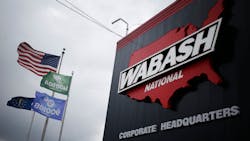Wabash National Corp. executives accentuated the positive in the company’s first-quarter earnings call on May 14, even as they reported a 30% decline in trailer shipments and an operating loss of $110 million driven largely by the impact of the COVID-19 pandemic on the Final Mile Products business.
“The COVID-19 pandemic is sure to have a significant impact on the economy in 2020, though we have been encouraged by the relative stability of our backlog through this time,” explained Brent Yeagy, Wabash president and CEO. “Over the last several years we have been preparing the company for an eventual downturn in our end markets and have taken steps to fortify our balance sheet by building cash, repaying debt and ensuring credit availability. These steps have positioned us well to successfully navigate this extraordinary time, while the continued execution of our strategic plan during this period will allow us to emerge stronger.”
Yeagy emphasized key customers’ demonstrated ability to work around the challenges facing fleets as well as the continued strength of the company’s order backlog.
“We’re finding, as we expected, customers within our strategically managed customer portfolio have been relatively resilient as compared to their peers,” he said. “We can see in the earnings calls with some of our largest customers how they plan to maintain capital spending, specifically on trailers as they look to manage fleet age and operating cost per mile throughout the rest of the year. And just as we have learned how to manage through a downturn, they have as well. And they don’t want to get on the wrong side of an average age per trailer, as they did come out of the ’08, ‘09 time periods.”
Wabash National’s backlog at end of the first quarter was approximately $1 billion, compared to $1.1 billion at the end of 2019.
“This is much less than the 20% decline that is seen in the broader industry over the same time period,” Yeagy said. “We feel very good about these industry figures, as they continue to imply our share position.”
Still, even though production was in line with expectations, “customer pickups were not,” Yeagy noted, resulting in a revenue shortfall for the Commercial Trailer Products segment—the bulk of Wabash business—during the first quarter. (Wabash doesn’t book revenue until products are delivered.)
The immediate impact of COVID-19 was much more dramatic on the Final Mile segment, which is facing significantly lower cash flow for the near term.
“In the truck body world, we’re significantly moving product in the urban centers—urban centers that are disproportionately impacted by municipal restrictions,” Yeagy said. “They were significantly more impacted by literal COVID risk, populations were impacted, people were distracted, and businesses were distracted. Picking up truck bodies was probably not high on individuals’ lists during that period of time.”
However, Yeagy also noted that “an area of risk” remains with regard to chassis deliveries as truck OEMs deal with COVID-19 related plant shutdowns.
Chief Financial Officer Mike Pettit explained that the $107 million impairment charge relating to the acquisitions of the Walker Group and Supreme Industries was to adjust previous projections “given the uncertainty of the current environment” for Final Mile.
“Brent and I would like to reinforce in the strongest terms possible that our Final Mile business remains an exciting opportunity and a growth platform that we intend to leverage in the short, medium and long term,” Petit said. “The progress we’ve made to recapture our share combined with Wabash’s technology offerings will continue to resonate in the marketplace, and we continue to work diligently on the operating performance within this business to ensure profitable growth.”
Both Yeagy and Pettit also framed the current economic downturn by comparing it to the Great Recession—and they insisted Wabash National is in much stronger position this time around.
“This is not our folks’ first time at the dance, and our collective experience of managing through a market downturn—regardless of cause—is deep,” Yeagy said. “We expect to show that Wabash National is a more resilient company than we’ve ever been in the past.
“We intend to leverage this crisis to further distance ourselves from our competition. This crisis has afforded us the opportunity to move back faster with organizational changes that were already underway, which we believe will allow us to increase our level of intimacy with our customers and drive an accelerated pace of customer-focused innovation that further differentiate our products in the marketplace.”
Pettit stressed the company has “contingency plans for multiple scenarios,” and “additional levers that we’re ready and able to pull, should the situation dictate.”
“First and foremost, in early 2008, the company did not have the cash or liquidity balance that it enjoys today,” Pettit said. “This lack of liquidity, combined with limited access to fresh capital during the financial crisis, forced the company to take drastic steps that we’ll not repeat. I think it’s fair to say that experience has led to the scar tissue around the organization—and those are mistakes that we’ll not repeat.”
By the numbers
Net sales for the first quarter 2020 were $387 million, hampered by lagging customer pickups of completed trailers. Operating loss was $110 million principally driven by goodwill impairment of $107 million during the quarter, while non-GAAP adjusted operating loss was $2.9 million resulting from lower revenue and previously anticipated manufacturing inefficiencies in the company's Final Mile segment, compounded by the initial impact of COVID-19.
Total Company backlog ending March 2020 was approximately $1 billion compared to backlog of $1.1 billion ending December 2019.
By business segment, Commercial Trailer Products’ net sales for the first quarter were $251 million, a decrease of $90.1 million, or 26.4% as compared to the first quarter in 2019 “as a result of an anticipated normalization of market demand as well as slower customer pickups of equipment.” Wabash shipped 8,525 new trailers in the quarter, down from 12,400 a year ago. Operating income decreased $10.5 million, or 39.7% to $15.9 million as a result of volume leverage on lower revenues during the quarter.
Diversified Products’ net sales for the first quarter were $83 million, a decrease of $16.7 million, or 16.7%, as compared to the prior year. While the tank trailer business showed relative stability, revenue was more than offset by lower volumes in the composites business, Wabash reported. The segment shipped 625 trailers in the first quarter, compared to 700 in Q1 2019. Operating loss in the first quarter of 2020 was $6.1 million, impacted by a non-cash goodwill impairment of $11 million during the quarter related to the 2012 acquisition of the Walker Group. Operating income on a non-GAAP adjusted basis was $4.9 million.
Final Mile Products’ net sales for the first quarter totaled $60 million, a decrease of $40.6 million, or 40.2%, again due to slower customer pickups and softer demand compounded by COVID-19. Operating loss was $108 million after a non-cash goodwill impairment charge of $95.8 million during the quarter related to the 2017 acquisition of Supreme Industries. Operating loss on a non-GAAP adjusted basis was $12.3 million due to previously anticipated manufacturing inefficiencies related to demand patterns and product mix as well as negative impacts from COVID-19.
About the Author
Kevin Jones
Editor
Kevin has served as editor-in-chief of Trailer/Body Builders magazine since 2017—just the third editor in the magazine’s 60 years. He is also editorial director for Endeavor Business Media’s Commercial Vehicle group, which includes FleetOwner, Bulk Transporter, Refrigerated Transporter, American Trucker, and Fleet Maintenance magazines and websites.
Working from Beaufort, S.C., Kevin has covered trucking and manufacturing for nearly 20 years. His writing and commentary about the trucking industry and, previously, business and government, has been recognized with numerous state, regional, and national journalism awards.

